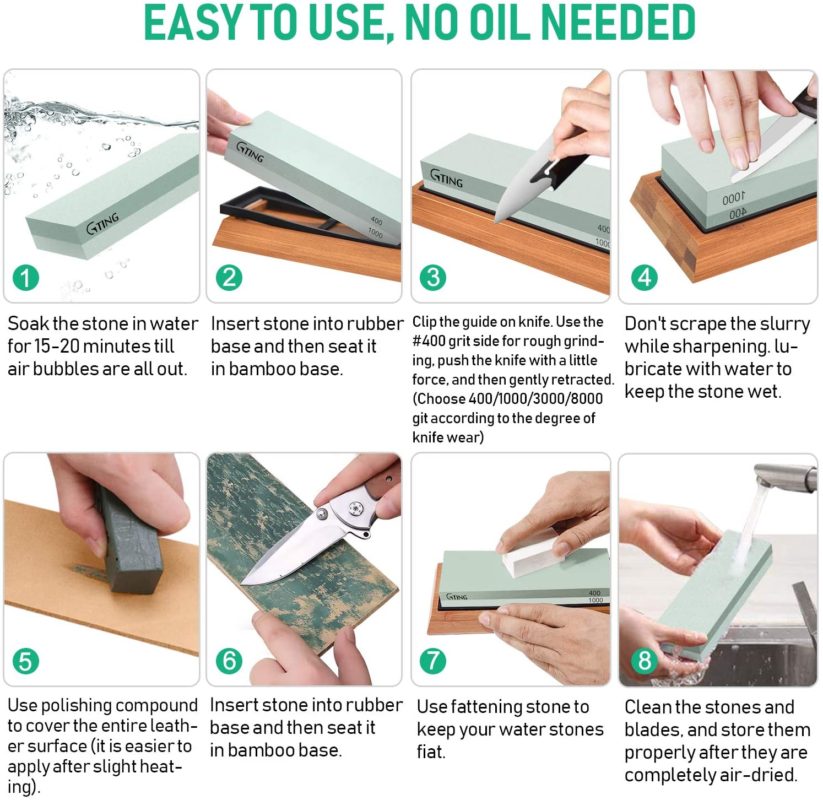Comprehending how to use a whetstone to hone a knife supports you to get near and imply to the work. It additionally frequently occurs in a better sharpening—and, honestly, it just seems extra satisfying!
You can grind your knives in any figure of style. There are electric sharpeners, filing systems, and belt systems. Several producers also give a sharpening service. Utilize that, though, and you have to send your knives back to the shop and wait a few weeks for them to return. You could simply learn how to use a whetstone at BestDamascusKnife.
What Is the Distinction In a Whetstone and a Waterstone?
While there is such a device as a Waterstone, which is intended to serve below running water, do not let the name mislead you. The distinction between a Waterstone and a whetstone is that a Waterstone is a real stone, frequently Japanese, owing to geological characteristics unusual to that portion of the planet. Wetting it makes it evaporate, creating a gritty clay that eases grind away steel.
A whetstone is a distinctive variety of stone, seldom original, sometimes synthetic. Some whetstones are OK to wet, others not. For example, soaking a plastic whetstone can significantly reduce its lifespan. Repeat, discuss the guidance given by your stone’s producer before doing anything you are not certain about.
How To Use A Whetstone? Step By Step Guide

How To Use A Whetstone Step By Step Guide
A genuine knife is expected to be the most essential device in your kitchen therefore it is smart to hold it razor-sharp. One of the most reliable means to sharpen your knife is to utilize a whetstone – it needs a little time and tolerance but, once you have learned it, you’ll nevermore have to battle repeatedly with a dull knife.
We have further laid out a step by step tutorial on how to use a whetstone below.
- Sink your whetstone in water for 10 to 15 minutes. The Whetstones appear with various resolutions or grains (a variety of like sandpaper). A coarse grain (a more moderate number) will sharpen the metal of the knife fast. A more elegant grain (a higher number) will soften and clean the blade, giving a sharper and long-lasting edge. Some whetstones have two distinct grains.
- Put the whetstone over a tea cloth or a surface on which it will not move. Put it with the coarse grain facing up.
- Now hold your knife securely. Put your blade at an angle of almost 20 degrees to the whetstone. To make this angle, put your knife at 90 degrees, half this to 45 degrees, and a half repeatedly. The angle of your blade is essential and some knives will need insignificantly varying angles (for instance, Japanese knives) therefore you may lack to do some additional analysis on your particular knife.
- Put steady and moderate pressure on your knife and pull the blade on the stone from the top to the handle. Replicate a couple of times. Then turn the knife up and repeat on the other side. It is necessary to redo the identical method on the opposite side of the knife (except you are dealing with a Sashimi knife or something related which will need more extra procedure).
- Experiment with your knife (be cautious not to cut yourself). You can experiment with it using some fruit rather than your finger!
- Turn over the whetstone and replicate the method utilizing the finer grain.
- Redo the method on both sides of your knife. Whetstones are an excellent alternative for keeping your knife collection in top nick but do not get extremely taken away and over grind your knives or place extremely much force on the blade. The angle you put your knife on the whetstone is necessary therefore do some analysis before you grind away if you have an especially fancy knife. Some whetstones come with convenient angle guides.
You do not necessitate to utilize a whetstone to maintain your knives but simply to sharpen them when they are in requirement.
How to Grind a Knife With an Electric Sharpener
An electric sharpener uses the guesswork out of the method because it is simple to use. It aids to reshape the tip of the knife by raising a good quantity of metal. If your knife is broken or you just do not need to complain about a whetstone, this is a great method to go. Follow the manufacturer’s directions. The tools come with diverse slots based on the stiffness of the blade, but in general, the method includes pulling the blade by the slot you have taken, gently and firmly, till the knife can perform its job with comfort yet again. There is usually more extra than one speed and more extra than one setting (additionally referred to as levels of grit) on electric sharpeners.
Difference Between Sharpening Vs Honing
What do you use a sharpening steel, or rod, to hone your knives? If you own a knife block, you have a rod held in there between the knives.
The most reliable method to explain the distinction between these two activities is that sharpening will grind the knife’s edge, and honing does not sharpen the knife per se. It simply hones the edge of a blade that has dulled by clearing it along with the steel, realigning the edge. This enables for cuts that are more fluid and more reliable; honing is what you do in within sharpening. Consider it as a bit of tune-up, whereas sharpening is extra extensive knife maintenance.
How to Sharpen a Serrated Knife
The serrated knife does not require sharpening as frequently as your chef’s knife or your paring knife, state, but it yet requires some caution. The method is unusual because the shape of the blade is changed; the serrated knife has a range of rounded serrations, and one side is flat, whereas the other side is beveled. You just sharpen the beveled side, and the most reliable method to do that is with a sharpening rod, which is comparable to honing steel, but it is smaller, extra narrow, and pointed. You use the rod flush with the bevel to get the best angle and just drag the rod apart from the serrations.
Conclusion
Overall, how to use a whetstone? using a whetstone is not rocket science. Though, it needs some training to get it right. Managing the angle while driving the knife makes up the biggest learning curve of this blade-sharpening process. Once you turn in a way, you can start arranging your angle for particular applications and steel blends that you have.
If you are an old hand at sharpening knives and have any suggestions and tricks for how to use a whetstone, feel free to add them in the comments section below.
Editor’s Recommendations
- How To Mix Dough Without A Mixer
- How to use a dough whisk
- Dough Hook Alternative
- What Is A Flat Whisk Used For
- Why Do You Need Dough Whisk
- Why Every Baker Needs A Danish Dough Whisk
- Dutch vs Danish
- How to seal the chalk paint kitchen cabinets

